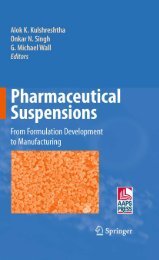Diacylglycerol Signaling
Diacylglycerol Signaling
Diacylglycerol Signaling
Create successful ePaper yourself
Turn your PDF publications into a flip-book with our unique Google optimized e-Paper software.
450 C. Brodie and S.L. Lomonaco<br />
normal and neoplastic keratinocytes when overexpressed by an adenoviral vector. Molecular<br />
and Cellular Biology, 19, 8547–8558.<br />
Li, J., Vesey, D. A., Johnson, D. W., & Gobe, G. (2007). Erythropoietin reduces cisplatin-induced<br />
apoptosis in renal carcinoma cells via a PKC dependent pathway. Cancer Biology & Therapy,<br />
6, 1944–1950.<br />
Li, C., Wernig, F., Leitges, M., Hu, Y., & Xu, Q. (2003). Mechanical stress-activated PKCdelta<br />
regulates smooth muscle cell migration. FASEB Journal, 17, 2106–2108.<br />
Li, S.Y., Yu, B., An, P., Liang, Z. J., Yuan, S. J., & Cai, H. Y. (2004). Effects of cell membrane<br />
phospholipid level and protein kinase C isoenzyme expression on hepatic metastasis of colorectal<br />
carcinoma. Hepatobiliary & Pancreatic Diseases International, 3, 411–416.<br />
Liu, J., Chen, J., Dai, Q., & Lee, R. M. (2003). Phospholipid scramblase 3 is the mitochondrial<br />
target of protein kinase C delta-induced apoptosis. Cancer Research, 63, 1153–1156.<br />
Liu, Z., Liu, X., Nakayama, K. I., Nakayama, K., & Ye, K. (2007). Protein kinase C-delta phosphorylates<br />
Ebp1 and prevents its proteolytic degradation, enhancing cell survival. Journal of<br />
Neurochemistry, 100, 1278–1288.<br />
Liu, H., Lu, Z. G., Miki, Y., & Yoshida, K. (2007). Protein kinase C delta induces transcription of<br />
the TP53 tumor suppressor gene by controlling death-promoting factor Btf in the apoptotic<br />
response to DNA damage. Molecular and Cellular Biology, 27, 8480–8491.<br />
Lomonaco, S. L., Kahana, S., Blass, M., Brody, Y., Okhrimenko, H., Xiang, C., et al. (2008).<br />
Phosphorylation of protein kinase Cdelta on distinct tyrosine residues induces sustained activation<br />
of Erk1/2 via down-regulation of MKP-1: Role in the apoptotic effect of etoposide. The<br />
Journal of Biological Chemistry, 283, 17731–17739.<br />
Lorenzo, P. S., & Dennis, P. A. (2003). Modulating protein kinase C (PKC) to increase the efficacy<br />
of chemotherapy: Stepping into darkness. Drug Resistance Updates, 6, 329–339.<br />
Lu,W., Finnis, S., Xiang, C., Lee, H. K., Markowitz, Y., Okhrimenko, H., et al. (2007). Tyrosine<br />
311 is phosphorylated by c-Abl and promotes the apoptotic effect of PKCdelta in glioma cells.<br />
Biochemical and Biophysical Research Communications, 352, 431–436.<br />
Lu, Z., Hornia, A., Jiang, Y. W., Zang, Q., Ohno, S., & Foster, D. A. (1997). Tumor promotion by<br />
depleting cells of protein kinase C delta. Molecular and Cellular Biology, 17, 3418–3428.<br />
Lu, W., Lee, H. K., Xiang, C., Finniss, S., & Brodie, C. (2007). The phosphorylation of tyrosine<br />
332 is necessary for the caspase 3-dependent cleavage of PKCdelta and the regulation of cell<br />
apoptosis. Cellular Signalling, 19, 2165–2173.<br />
Mackay, H. J., & Twelves, C. J. (2007). Targeting the protein kinase C family: Are we there yet?<br />
Nature Reviews. Cancer, 7, 554–562.<br />
Mandil, R., Ashkenazi, E., Blass, M., Kronfeld, I., Kazimirsky, G., Rosenthal, G., et al. (2001).<br />
Protein kinase Calpha and protein kinase Cdelta play opposite roles in the proliferation and<br />
apoptosis of glioma cells. Cancer Research,61, 4612–4619.<br />
Martiny-Baron, G., & Fabbro, D. (2007). Classical PKC isoforms in cancer. Pharmacological<br />
Research, 55, 477–486.<br />
Mellor, H., & Parker, P. J. (1998). The extended protein kinase C superfamily. Biochemical<br />
Journal, 332 (Pt 2), 281–292.<br />
Meresse, P., Dechaux, E., Monneret, C., & Bertounesque, E. (2004). Etoposide: Discovery and<br />
medicinal chemistry. Current Medicinal Chemistry, 11, 2443–2466.<br />
Mhaidat, N. M., Thorne, R. F., Zhang, X. D., & Hersey, P. (2007). Regulation of docetaxelinduced<br />
apoptosis of human melanoma cells by different isoforms of protein kinase C.<br />
Molecular Cancer Research, 5, 1073–1081.<br />
Mischak, H., Goodnight, J. A., Kolch, W., Martiny-Baron, G., Schaechtle, C., Kazanietz, M. G.,<br />
et al. (1993). Overexpression of protein kinase C-delta and -epsilon in NIH 3T3 cells induces<br />
opposite effects on growth, morphology, anchorage dependence, and tumorigenicity. The<br />
Journal of Biological Chemistry, 268, 6090–6096.<br />
Miyamoto, A., Nakayama, K., Imaki, H., Hirose, S., Jiang, Y., Abe, M., et al. (2002). Increased<br />
proliferation of B cells and autoimmunity in mice lacking protein kinase Cdelta. Nature, 416,<br />
865–869.









